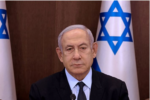U.S. President Donald Trump stated that both Russian President Vladimir Putin and Ukrainian President Volodymyr Zelensky expressed their desire for peace during separate phone calls with him. Following these discussions, Trump has directed top U.S. officials to initiate negotiations aimed at ending the war in Ukraine.
High-Level Diplomatic Efforts Begin
The phone calls took place after U.S. Secretary of Defense Pete Hegseth suggested that Ukraine should abandon its NATO membership aspirations and reconsider its demand to restore its pre-2014 borders. Hegseth made these remarks during his first NATO meeting in Brussels.
Following his over-hour-long conversation with Putin, Trump emphasized that the Russian leader supports ending the war and that they discussed achieving a ceasefire in the near future.
“He wants the war to end. He doesn’t want a temporary halt only for fighting to resume in six months,” Trump told reporters at the White House.
“I believe we are on the path to peace. President Putin wants peace, President Zelensky wants peace, and I want peace. I simply don’t want to see more people getting killed,” Trump added.
Although Trump has long promised to end the war in Ukraine, he has yet to provide details on how he plans to achieve it.
Potential Trump-Putin Meeting on the Horizon
The Kremlin confirmed that Putin and Trump agreed to meet, with the Russian leader inviting the U.S. president to Moscow. Trump stated that their first meeting could “possibly” take place soon in Saudi Arabia.
On his social media platform, Trump announced that Secretary of State Marco Rubio, CIA Director John Ratcliffe, National Security Advisor Michael Waltz, and Special Envoy to the Middle East Steve Witkoff will lead negotiations to end the war.
Zelensky Discusses Peace Prospects with Trump
After Trump’s conversation with Putin, he also spoke with Zelensky, in a call that lasted about an hour.
“I had a meaningful conversation with the President of the United States. We discussed… the possibilities for achieving peace and our readiness to work together… as well as Ukraine’s technological capabilities, including drones and advanced industries,” Zelensky wrote on X.
Trump confirmed that Secretary Rubio and Vice President JD Vance will hold discussions on the war at the annual Munich Security Conference on Friday, where Ukrainian officials will also be present.
Prisoner Exchange Signals Diplomatic Shifts
The phone calls followed a U.S.-Russia prisoner exchange, in which Russia released American teacher Marc Fogel after three years in prison on drug possession charges. In return, the U.S. is freeing Russian cybercriminal Alexander Vinnik, who was convicted of cryptocurrency fraud and money laundering. Vinnik, currently imprisoned in California, is awaiting transport back to Russia, according to U.S. officials.
Ukraine’s Strategic Shift and NATO Uncertainty
This is the first time Putin has spoken to a U.S. president since his February 2022 call with Joe Biden, which was shortly followed by Russia’s full-scale invasion of Ukraine.
During the first year of the war, Ukraine successfully pushed Russian forces back from Kyiv and reclaimed significant occupied territories. However, since the failed Ukrainian counteroffensive in 2023, Russia has regained momentum on the battlefield, gradually advancing and inflicting heavy casualties on both sides.
Moscow currently controls about one-fifth of Ukraine and demands further territorial concessions as part of a peace deal, while also insisting that Kyiv permanently adopt a neutral status. Meanwhile, Ukraine insists on Russia’s full withdrawal from occupied territories and seeks NATO membership or equivalent security guarantees to prevent future Russian aggression.
Recent discussions indicate Kyiv is coming to terms with the reality that NATO membership is unlikely in the near future. Instead, Ukrainian leaders are emphasizing the need for military support as part of a peace agreement.
“If Ukraine is not in NATO, then Ukraine must build NATO within its borders. That’s why we need a military as large as Russia’s today,” Zelensky told The Economist in an interview published Wednesday.
“For that, we need weapons and funding. And we will ask the United States for them,” he said, calling this his “Plan B.”







